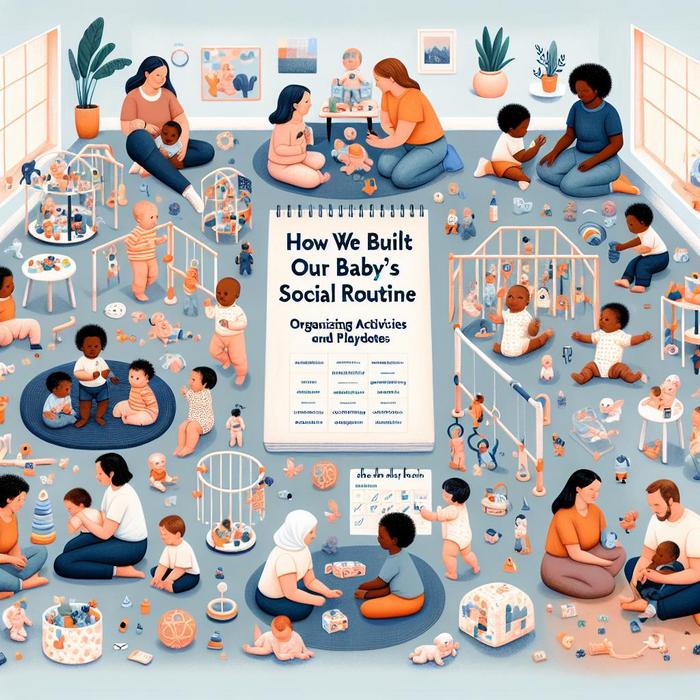Creating a Baby Social Routine: The Importance of Interactive Activities
Establishing a baby social routine is one of the first steps towards building socialization skills, developing friendships, and encouraging growth and development. Organizing activities and playdates for your baby can help strengthen their social and emotional skills while promoting a sense of joy and community. In this section, let’s dive into the significance of a baby’s social routine and how interactive activities can foster their overall well-being.
The Impact of a Regular Social Routine on Baby’s Development
A well-structured social routine for your baby can offer several benefits:
- Enhanced Cognitive Development: Interactive activities enable babies to explore their environment, improving their understanding and learning abilities.
- Boosted Social Skills: Interaction with fellow infants during playdates can enhance your baby’s social skills, laying the foundation for building friendships.
- Improved Emotional Stability: Regular social interaction can also help in managing toddler emotion swings and nurturing emotional intelligence.
Choosing Safe and Engaging Activities for Your Baby’s Social Routine
Choosing safe and engaging activities for your baby is crucial in organizing a nurturing social routine. Here are some stimulating activities for your baby:
- Musical Games: Musical activities have been shown to boost cognitive and social skills in babies. Consider organizing a ‘baby music band’ during playdates.
- Storytelling Sessions: Babies are naturally drawn to sounds and gestures. Engaging them in storytelling sessions can stimulate their imagination and introduce them to language skills.
- Free Play: Letting babies explore toys and interact with their surroundings can encourage independent thinking and creativity.
Organizing Playdates: Step towards Building Friendships
Playdates are an excellent tool for building your baby’s social routine, fostering interaction with other children. Here are some tips for organizing successful playdates:
- Plan Ahead: Choose a convenient time and place for both the kids and the parents. Ensure the environment is safe and baby-friendly.
- Create a Flexible Schedule: While it’s important to have a plan, be prepared for changes. Babies may need naps, feedings, or diaper changes, so keep the schedule flexible.
- Prepare Engaging Activities: Have a variety of toys and games ready to keep the babies entertained and engaged.
Remember, every baby is unique, and their pace of social interaction may vary. It’s okay if your baby seems shy or takes more time to interact with other kids. The point is to provide them opportunities to explore social interaction in their own comfort zone.
Overcoming Social Anxiety in Parenthood
Organizing playdates and establishing a baby social routine often brings about a degree of social anxiety among parents. It’s crucial to remember, you are not alone. Consider joining local parents’ groups or online forums to share concerns, learn from experiences, and get support.
Journey Onwards: Building Your Baby’s Social Routine
As you embark on the journey of establishing your baby’s social routine, remember the process should be enjoyable for both you and your baby. Make sure the focus is on building relationships, nurturing skills, and most importantly, creating happy memories.
Starting with the Basics: Baby’s Vision and Hearing
Babies have already started their learning journey even before they begin socializing. This happens through their sense of vision and hearing. Things like recognizing mom’s voice or observing parents’ facial expressions are all part of initial learning progress. Role play, peekaboo games and talking to your baby constantly would make these activities fun and enjoyable for both of you while also aiding their development.
Importance of a Balanced Routine
Balancing various activities in your baby’s routine would help them grasp the world around them in a more wholesome manner. A well-balanced routine incorporates activities such as physical games and solo play for aiding cognitive development, interactive playdates for enhancing social skills, and meal and nap schedules for imposing structure.
Incorporating Social Skills into Homeschooling Routines
As parents, you can also take active measures to incorporate social skills into your baby’s homeschooling routines. It could be as simple as setting a routine play time or inculcating joint reading time marking social progress alongside academic growth.
Finding the Right Playgroup
Once your baby is ready, introducing him or her to a suitable playgroup is a crucial step in their social development. Make sure to identify a baby-friendly environment where your baby can learn and grow at his or her own pace. Some things to consider might include the playgroup’s philosophy, staff, facilities, and the feedback from other parents.
When To Start Taking Your Baby To Playgroups?
Wondering when to start taking your baby to a playgroup? There is no definitive answer or age. It’s all about when you and your child feel ready. Some babies might enjoy early social interaction, while others might need more time.
Social Games for Babies and Toddlers
There are plenty of social games for babies and toddlers that you can introduce to your child. These games can be anything from structured activities like circle time or free-play games like making music together or playing with building blocks. The goal is to provide multiple opportunities for your baby to interact and learn from their peers.
The Role of Play in Promoting Healthy Child Development
Several studies have proven the importance of play in promoting healthy child development. Play, especially free-play, promotes cognitive, physical, social, and emotional well-being in a child. It allows your baby to use their creativity while developing their imagination, dexterity, and physical, cognitive, and emotional strength.
Final Thoughts
A baby’s social development is an exciting journey filled with blooming relationships and learning experiences. It’s something that both parents and baby can enjoy. As we engage in this task, let’s give them the freedom to explore and make sense of the world around them. As parents, our role is to provide them with love, support, and guide them on this wonderful adventure of growth and learning.

